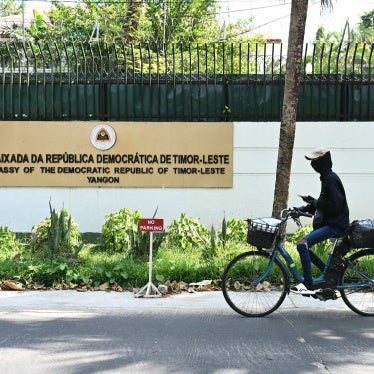The undersigned organizations and individuals write to express grave concerns and unequivocally oppose the Trump administration’s use of the sanctions authority of the United States to attack the International Criminal Court (ICC), an independent judicial institution dedicated to combatting impunity for the gravest crimes known to humanity.
Many of the undersigned spoke out against steps in this direction taken earlier this year by the U.S. administration. We now issue this further statement because it is uniquely dangerous, extreme, and unprecedented to utilize a mechanism designed to penalize criminals, their aiders, and abettors, against an independent judicial institution. Asset freezes and entry restrictions are tools intended to combat individuals and entities constituting a threat to U.S. national security. By applying these measures to a court that 123 countries – and on two occasions, the United Nations Security Council – have entrusted with providing accountability for atrocity crimes, the United States has brought upon itself the stigma of siding with impunity over justice. The administration’s actions jeopardize the ability of desperate victims to access justice, weaken the credibility underpinning the use of sanction tools in other contexts, and put the United States at odds with its closest allies.
The ICC represents and constitutes part of a global system of international justice of which the United States was a chief architect at Nuremberg and beyond. Today, the ICC, alongside other tribunals, regional mechanisms, and national courts, is carrying forward these efforts through investigations and prosecutions that could help realize justice for atrocity victims from Sudan to Myanmar. As a court of last resort, the ICC only can intervene when and where a State has demonstrated unwillingness or inability to hold its nationals to account for crimes within the Court’s jurisdiction. The ICC therefore provides an essential backstop for victims who have no other recourse to justice. The use of sanctions has the potential for wide-reaching impact against this institution dedicated to advancing justice for victims.
At an historical moment when the global rule of law is under attack from multiple fronts, institutions like the International Criminal Court are needed more than ever to advance human rights protections and the universal goal of preventing future atrocities. Instead, these sanctions send a signal that could embolden authoritarian regimes and others with reason to fear accountability who seek to evade justice. It is essential that the United States answer any allegation of wrongdoing in a manner that does not betray the cause of global justice, abandon international cooperation, or compromise support for human dignity and rights.
As human rights, legal, and faith-based organizations, as well as individuals who have dedicated their careers to these causes, we call upon the U.S. government to rescind the Executive Order authorizing sanctions and return to constructive engagement with the ICC. We urge other governments, Members of Congress, and advocates for victims everywhere to raise their voices to oppose these measures. We invite allies of justice to join us in standing against these destructive measures/attacks.
The Advocates for Human Rights
American Civil Liberties Union (ACLU)
American Jewish World Service
Amnesty International USA
Center for Civilians in Conflict (CIVIC)
Center for the Study of Law and Genocide, Loyola Law School
Cornell International Human Rights Clinic
Darfur Women Action Group Freedom Forward
Global Centre for the Responsibility to Protect
Global Justice Center
Global Justice Clinic, NYU School of Law*
Human Rights Center, University of California, Berkeley School of Law
Human Rights First
Human Rights Institute, Georgetown University Law Center
Human Rights Watch
International Center for Transitional Justice
International Criminal Court Alliance
International Criminal Court Student Network
J Street
Leitner Center for International Law and Justice, Fordham Law School
The Maryknoll Office for Global Concerns
Never Again Coalition
Pax Christi USA
Physicians for Human Rights
Project Blueprint
The Promise Institute for Human Rights, UCLA School of Law
Robert F. Kennedy Human Rights Center
The Sentry
Syria Justice & Accountability Center
United Church of Christ, Justice and Witness Ministries
The United Methodist Church – General Board of Church and Society
United Nations Association - Greater Philadelphia
U.S. Campaign for Burma
Victim Advocates International
Win Without War
World Federalist Movement/Institute for Global Policy (WFM/IGP)
World Without Genocide at Mitchell Hamline School of Law
* Endorsement by the Global Justice Clinic (GJC) does not reflect the institutional views, if any, of NYU.
Affiliations of individuals are for identification purposes only.
Enid H. Adler, Esq.
Todd F. Buchwald, Former Ambassador, Office of Global Criminal Justice, U.S. Department of State
Professor Doug Cassel, Emeritus Professor of Law, Notre Dame Law School
Yasmine Chubin, Former Trial Lawyer, Office of the Prosecutor, ICC (2014-2017)
Professor David M. Crane, Founding Chief Prosecutor, Special Court for Sierra Leone; Founder, Global Accountability Network
Professor Megan A. Fairlie, Professor of Law, Florida International University College of Law
Benjamin B. Ferencz, Chief Prosecutor, Einsatzgruppen Trial, Nuremberg War Crimes Tribunal
Professor Mark Harrison, Clinical Professor, Cornell Law School
Dr. Mark Kersten, Consultant, Wayamo Foundation; Researcher, Munk School of Global Affairs, University of Toronto
Jeremy Kuester, Former Deputy Associate Director, U.S. Department of the Treasury/Financial Crimes Enforcement Network
Stephen J. Rapp, Former U.S. Ambassador-at-Large for Global Criminal Justice (2009-2015)
Professor Leila Nadya Sadat, James Carr Professor of International Criminal Law, Washington University School of Law
Professor Michael P. Scharf, Joseph C. Hostetler – BakerHostetler Professor of Law, Case Western University School of Law
David J. Scheffer, U.S. Ambassador-at-Large for War Crimes Issues (1997-2001)
Rebecca A. Shoot, Interim Convener, Washington Working Group for the International Criminal Court (WICC)
Professor Jane Stromseth, Francis Cabell Brown Professor of International Law, Georgetown University Law Center
Professor Jennifer Trahan, Clinical Professor, NYU Center for Global Affairs
Professor Johan D. Van der Vyver, I.T. Cohen Professor of International Law & Human Rights, Emory University School of Law
John Washburn, Founding Convener, Washington Working Group for the International Criminal Court (WICC)
Clint Williamson, U.S. Ambassador-at-Large for War Crimes Issues (2006-2009)








